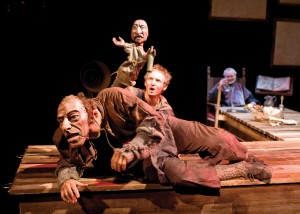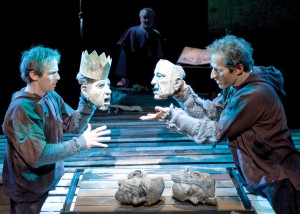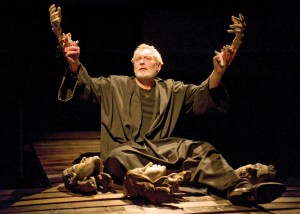A FEAST FOR THE SENSES
(LEAVE YOUR MIND BEHIND)
Chicago’s Redmoon Company is famous for its work in puppet theater. The Chicago Shakespeare Theater is the preeminent classical theater in the region. So when the two companies combine on an adaptation of Shakespeare’s late romance The Tempest, the prospects are enticing for a special evening of theater. The adaptation, titled The Feast: an intimate Tempest, is undeniably something special if the audience seeks a production of vivid, sometimes startling originality. The visual and auditory aspects of the adaptation carry the evening. But patrons shouldn’t expect a coherent narrative line or probing insights into the story and characters. This is a theatrical experience for watching and listening, not necessarily for thinking.
Created and directed by Jessica Thebus and Redmoon co-artistic director Frank Maugeri, this adaptation runs about 65 minutes with no intermission in the intimate Upstairs Theater at the CST. The show is indeed intimate, with only three actors, plus two behind-the-scenes puppeteers. John Judd plays Prospero, the magician who rules an enchanted island. Twelve years before the start of the action, he was marooned with his daughter Miranda after being deposed from his kingdom in Milan by his treacherous brother Antonio and Alonso, the king of Naples. Now Prospero creates a storm that wrecks a ship on his island, a ship that carries Antonio and Alonso and a cluster of other characters, including Ferdinand, the son of the king of Naples and soon to become Miranda’s beau.
Shards of the plot are doled out in this version, but viewers who don’t know the story will struggle to figure out what’s happening. In the opening minutes, Prospero rehearses parts of the narrative with the other two characters in the play, the sprite Ariel (Samuel Taylor) and the monster Caliban (Adrian Danzig). Prospero impatiently rings a bell to restart a scene each time the other two characters fail to satisfy him with their line readings. The audience isn’t secure as to whether they are watching Prospero’s rehearsal or the actual events in the story. And the momentum of the jagged narrative is often blunted by extended silences that suggest deep dramatic waters I couldn’t identify.
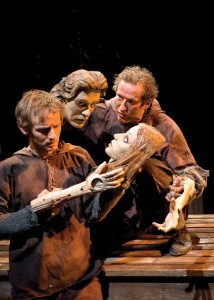 The language in The Feast comes from the Shakespeare original and preserves some of the more familiar passages of The Tempest, notably Prospero’s “Our revels now are ended” monologue (but we don’t get to hear Miranda proclaim “O Brave new world”). Judd’s Prospero is an irritable old man who still melts with emotion as the play winds down. Ariel and Caliban portray other characters from the original, such as Miranda, Ferdinand, and a pair of drunken stewards (injected by Shakespeare for comic relief), who plead for their freedom from Prospero’s magical powers.
The language in The Feast comes from the Shakespeare original and preserves some of the more familiar passages of The Tempest, notably Prospero’s “Our revels now are ended” monologue (but we don’t get to hear Miranda proclaim “O Brave new world”). Judd’s Prospero is an irritable old man who still melts with emotion as the play winds down. Ariel and Caliban portray other characters from the original, such as Miranda, Ferdinand, and a pair of drunken stewards (injected by Shakespeare for comic relief), who plead for their freedom from Prospero’s magical powers.
The three actors all do well, with Judd demonstrating that he would make a fine Prospero in a full length and more orthodox presentation. Taylor and Danzig are kept busy moving from character to character; their rendering of Ariel and Caliban briefly suggests the characters’ resentment toward Prospero that normally helps drive the narrative of The Tempest. As soon as Danzig puts on the Caliban mask, his transformation into the monstrous slave is particularly effective.
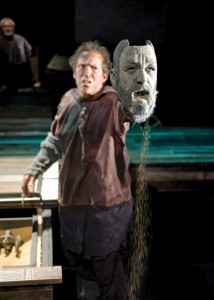 Multi media images are projected onto screens at the rear of the playing area (design by Mike Tutaj), which is a stage of wooden planks shaped like a cross (Neil Verplank is credited as “scenic engineer/builder”). Ariel and Caliban change characters by assuming wonderfully expressive masks (designed by Andrea Everman and Jesse Mooney-Bullock, who also worked on the puppets) – the mask that Danzig wears as Caliban is a marvel of grotesque ugliness, and the mask representing Miranda delicately replicates a beautiful and gentle maiden.
Multi media images are projected onto screens at the rear of the playing area (design by Mike Tutaj), which is a stage of wooden planks shaped like a cross (Neil Verplank is credited as “scenic engineer/builder”). Ariel and Caliban change characters by assuming wonderfully expressive masks (designed by Andrea Everman and Jesse Mooney-Bullock, who also worked on the puppets) – the mask that Danzig wears as Caliban is a marvel of grotesque ugliness, and the mask representing Miranda delicately replicates a beautiful and gentle maiden.
The action is enhanced by atmospheric lighting effects (by Andrew H. Myers) and sounds (by Jeffrey Allen Thomas) that vary from dissonant jazz lines to pop songs that sound as if they are being played from a scratchy 78 rpm record. The design team, including co-costumers Sue Haas and Anna Glowacki, creates a fresh and absorbing sensory experience for sympathetic audiences; but the play’s final moments are a real coup de theater of light and sound.
The CST is to be commended for lending its resources to Redmoon to nurture and finally stage this adaptation. It’s a high risk endeavor but the risks were worth taking. A person with CST management said that The Feast is a hot ticket, and while negotiations are underway to extend the show, there is no guarantee it will run beyond its scheduled closing date. Therefore, enterprising lovers of Shakespeare and cutting edge stagecraft should act accordingly. Patrons may not like everything in the adaptation, but they have to admire the imagination and commitment captured in those 65 minutes.
photos by Michael Brosilow
The Feast: an intimate Tempest
Chicago Shakespeare Theater
ends on March 11, 2012
for tickets, visit Chicago Shakes
for more shows, visit Theatre in Chicago

